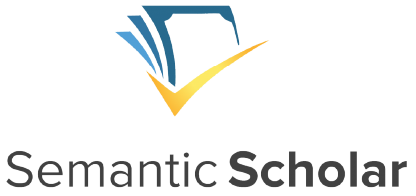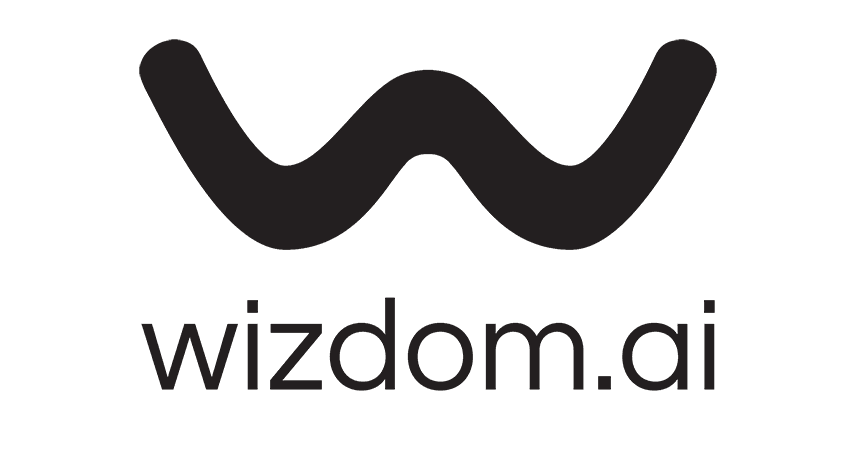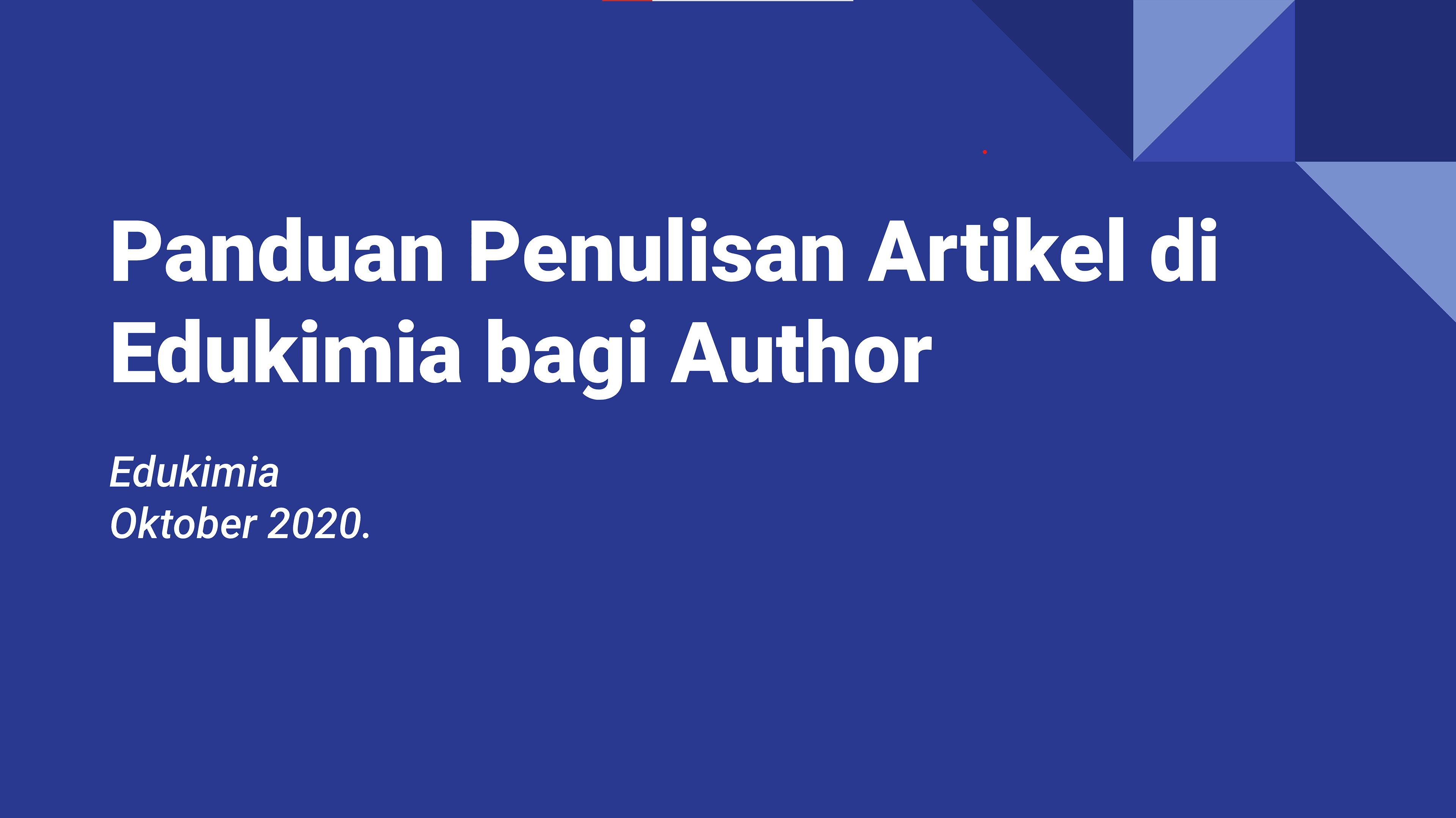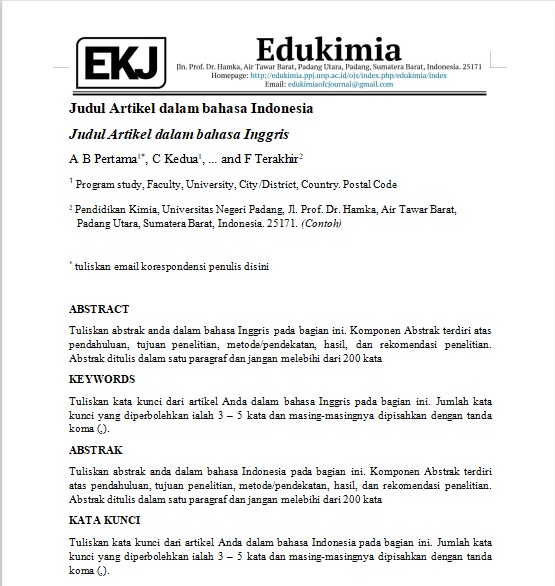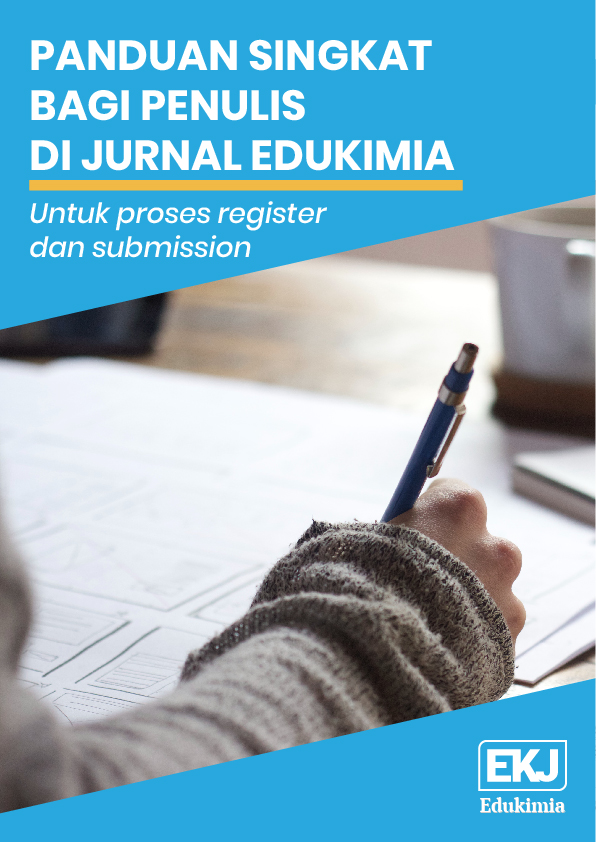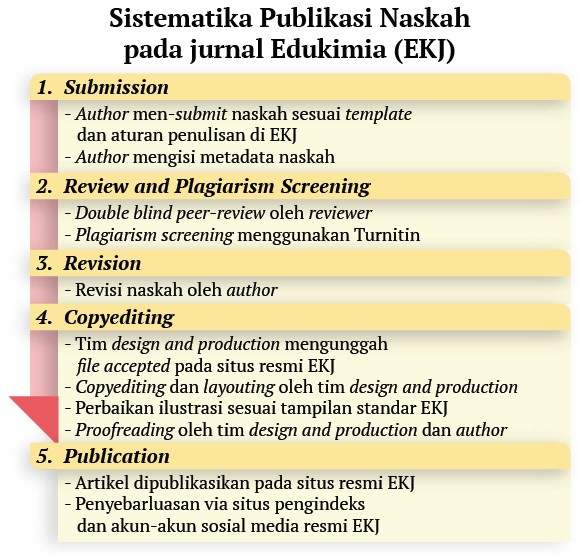Practicality of Redox and Electrochemical Cells E-Module Based on GDL for Class XII SMA
Article Metrics
The abstract has been viewed for 257 times.The full pdf article has been downloaded for 229 times.
Abstract
Keywords
Full Text:
EKJ 3 (2) - 2021 - Mareza (Bahasa Indonesia)References
Gusty S, Nurmiati N, Muliana M, Sulaiman OK, Ginantra NLWSR, Manuhutu, MA, Sudarso A, Leuwol NV, Apriza A, & Sahabuddin AA. Belajar Mandiri: Pembelajaran Daring di Tengah Pandemi Covid-19. Yayasan Kita Menulis; 2020,
Machin A. Implementasi pendekatan saintifik, penanaman karakter dan konservasi pada pembelajaran materi pertumbuhan. Jurnal Pendidikan IPA Indonesia. 2014;3(1):28–35.
Rahmi YL, Novriyanti E, Ardi A, Rifandi R. Developing Guided Inquiry-Based Student Lab Worksheet for Laboratory Knowledge Course. IOP Conference Series Materials Science and Engineering. 2018;335(1).
Adhim AY, Jatmiko B. Penerapan Model Pembelajaran Guided Discovery Dengan Kegiatan Laboratorium Untuk Meningkatkan Hasil Belajar Peserta didik Kelas X Sma Pada Materi Suhu Dan Kalor. J Inovasi Pendidikan Fisika. 2015;4(3):77–82.
Smitha. Inquiry Training Model and Guided Discovery Learning For Fostering Critical Thinking and Scientific Attitude. Kozhikode: Vilavath Publication; 2012.
Illahi M. Pembelajaran Discovery and Mental Vocational Skill. Yogyakarta: Diva Press; 2012.
Mayer RE. Should There Be a Three-Strikes Rule Against Pure Discovery Learning. American Psychologist. 2004; 59(1):14-19.
Nahdi DS. Eksperimentasi Model Problem Based Learning Dan Model Guided Discovery Learning Terhadap Kemampuan Pemecahan Masalah Matematis Ditinjau Dari Self Efficacy Siswa. Jurnal Cakrawala Pendas. 2018;4(1).
Yerimadesi, Kiram Y, Lufri, Festiyed. Development of guided discovery learning based module on colloidal system topic for senior high school. Journal of Physics: Conference Series. 2018;1116(4).
Yerimadesi Y, Bayharti B, Oktavirayanti R. Validitas Dan Praktikalitas Modul Reaksi Redoks dan Sel Elektrokimia Berbasis Guided Discovery Learning untuk SMA. Jurnal Eksakta Pendidikan. 2018;2(1):17.
Bayharti B, Azumar OR, Andromeda A, Yerimadesi Y. Effectiveness of redox and electrochemical cell module based guided discovery learning on critical thinking skills and student learning outcomes of high school. Journal of Physics: Conference Series. 2019;1317(1).
Majid A, Rochman C. Pendekatan Ilmiah dalam Implementasi Kurikulum 2013. Bandung: Remaja Rosdakarya; 2014.
Rahmi YL, Alberida H. Improving Students Higher Order Thinking Skills through Portfolio Assessment on Biology Curriculum and Textbook Analysis Course. Bioeducation Journal. 2017;1(1).
Aulia A, Andromeda A. Pengembangan E-Modul Berbasis Inkuiri Terbimbing Terintegrasi Multirepresentasi dan Virtual Laboratory pada Materi Larutan Elektrolit dan Nonelektrolit untuk Kelas X SMA atau MA. Edukimia. 2019;1(1).
Plomp T, Nieveen N. An Introduction to Educational Design Research. In: Proceedings of the seminar conducted at the east China Normal University, Shanghai (PR China). Netherlands Institute for Curriculum Development: SLO; 2007.
Retnawati H. Analisis Kuantitatif Instrumen Penelitian. Yogyakarta: Parama Publishing; 2016.
Kemendikbud. Panduan praktis Penyusunan E-Modul tahun 2017. Jakarta: Kementerian Pendidikan dan Kebudayaan; 2017.
Sukardi HM. Metode Penelitian Tindakan Kelas: Implementasi dan Pengembangannya. Bumi Aksara. Jakarta; 2013.
Perdana FA, Sarwanto S, Sukarmin S, Sujadi I. Development of E-Module Combining Science Process Skills and Dynamics Motion Material to Increasing Critical Thinking Skills And Improve Student Learning Motivation Senior High School. International Journal Science and Applied Science: Conference Series. 2017;1(1):45.
Rendra GRP, Darmawiguna IGM, Sindu IGP. Pengembangan E-Modul Berbasis Project Based Learning Menggunakan Schoology (Studi Kasus Mata Pelajaran Web Design Kelas XI Multimedia Di SMK TI Bali Global Singaraja). Kumpulan Artikel Mahasiswa Pendidikan Teknik Informatika. 2018;7(2):50
Refbacks
- There are currently no refbacks.

.jpg)


